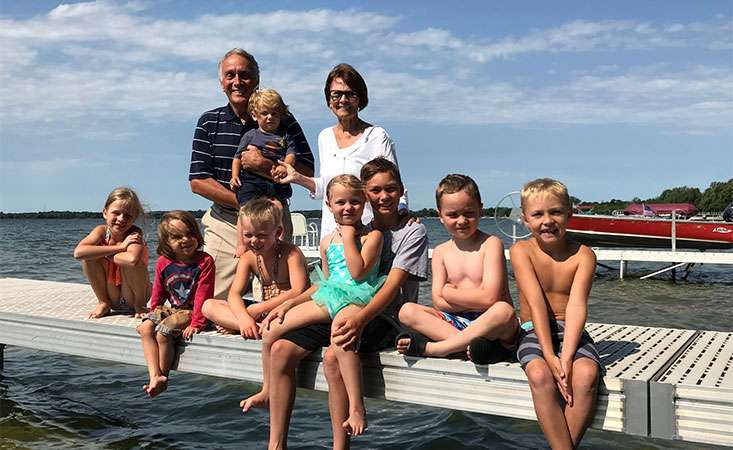
Steve Nelson is grateful to be able to spend many days on the lake with his wife and their eight grandchildren.
Editor’s note: In light of Pancreatic Cancer Awareness Month and our focus on the importance of biomarker and genetic testing, we are sharing this previously published blog about how genetic testing led to early detection of pancreatic cancer.
Steve Nelson, 70, of Battle Lake, Minn., is the oldest of eight siblings – four brothers and four sisters. Steve’s brother, Scott, is fourth in age and second in a much more sinister category: siblings to be diagnosed with cancer.
Scott, a fierce patient advocate and member of the Pancreatic Cancer Action Network’s (PanCAN) Survivor Council, was diagnosed with pancreatic cancer and underwent surgery in 2004.
Thirteen years later, Steve was on the operating table undergoing his own pancreatic surgery.
Prior to the siblings’ cancer diagnoses, the Nelson family already had a deep history with the disease.
“Our maternal great-grandmother died of ‘stomach’ cancer at the age of 53 – but at that time, there was no way of knowing whether it was in fact pancreatic cancer,” Steve said. “Our maternal grandmother died at 44 from breast cancer, and our mom was diagnosed with breast cancer at 52 and ultimately died of ovarian cancer at the age of 77.”
Due to their intense family history of cancer diagnoses, Steve and Scott’s mother opted to undergo genetic testing to determine whether there was a genetic link connecting her to other relatives affected by the disease.
She tested positive for a BRCA2 mutation.

Steve, pictured here with his wife, Jan, says he is “livin’ the dream” by enjoying lake life with his family.
To date, Steve said, more than 30 members of his immediate and extended family have been tested for genetic mutations linked to hereditary cancer. “A significant number carry the BRCA2 mutation – including Scott and me.”
Following Scott’s pancreatic cancer diagnosis and surgery, Steve was found to have prostate cancer two years later. To err on the side of caution, he opted for a radical prostatectomy.
Due to the potential risk of developing pancreatic cancer like their brother, Steve and several other siblings enrolled in the Cancer of the Pancreas Screening (CAPS) program, originated at Johns Hopkins University and led by Michael Goggins, MD. Steve was able to participate at the Mayo Clinic location in Minnesota.
The CAPS study was partially funded by PanCAN’s 2013 Skip Viragh – Inaugural Research Acceleration Network Grant, which awarded $1 million to Goggins and his team.
A 2018 publication highlights the value of the CAPS screening program for people at high risk for developing pancreatic cancer. Patients whose pancreatic tumors were found through the screening program were diagnosed with earlier-stage disease and had better outcomes, as compared to those whose tumors were diagnosed outside the program.
“I joined the CAPS study in 2009,” Steve said. “The way I figure it, the knowledge that you may be at risk for cancer is intimidating, whether you take a proactive approach, or you decide that you just don’t want to know.”
He continued, “But being proactive and engaging in early detection efforts, including genetic testing, provides you with a whole team that’s there to help you – including the medical community, scientists, historical knowledge, innovative testing methods, genetic counselors, clinical trials and support organizations like PanCAN.”
Through CAPS, Steve’s initial endoscopic ultrasound (EUS) showed two potentially alarming findings: a 6-millimeter pancreatic neuroendocrine tumor and a 2-millimeter cyst, both in the head of his pancreas.
“I was understandably very concerned, but the medical team was optimistic. They said when you look that closely, you’re bound to find something.
“I went on to a screening regimen of every six months, then once a year, and eventually I progressed to going in two-year intervals,” Steve said.

Brothers Steve (left) and Scott Nelson participated in PurpleRideStride Minnesota, proudly wearing their “Survivor” stickers.
In 2017, his EUS showed that Steve’s pancreatic duct was narrowing. Through an endoscopic retrograde cholangiopancreatography (ERCP), a stent was inserted to reopen the duct, and some nearby cells were scraped and collected.
“I’ll never forget the surgeon’s words in our initial meeting following that procedure,” he said. “He told me, ‘Your cells are telling us they’re just about to start something really bad.’”
Steve once again took an aggressive approach to his health. Rather than waiting, he chose to undergo surgery immediately to remove approximately two-thirds of his pancreas and several lymph nodes.
It took a couple months for Steve to feel back to normal and return to his semiretirement routine, which involves some management consulting work and significant travel. “My retirement didn’t quite work out as I had originally planned, but I’m having lots of fun,” he chuckled.
He also enjoys teaming up with his brother to raise awareness about pancreatic cancer and its genetics. “We have agreed to work together to do whatever we can to bring a little hope into the lives of pancreatic cancer patients and their families.”
Steve noted, “BRCA mutations don’t just affect women, although they’re best known to link to breast and ovarian cancer risk. Even that piece of information is something that could potentially save lives.”
Most of all, Steve is grateful for the support of his wife, Jan, his family, and of course, his brother. “My journey was a lot easier because Scott walked this path before I did,” he said. “And I deeply admire his advocacy efforts to ensure that others have an experience with this disease similar to mine.”
Steve added, “I’m the beneficiary of research progress that’s been made toward understanding pancreatic cancer’s genetic links and improvements in early detection. I give thanks every single day for my good fortune – and I’m hopeful that someday my experience will pave the way for improved outcomes for others down the road.”






